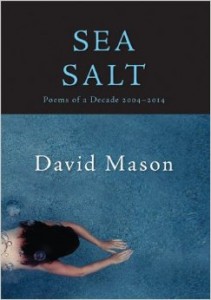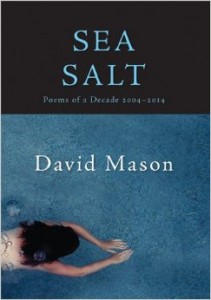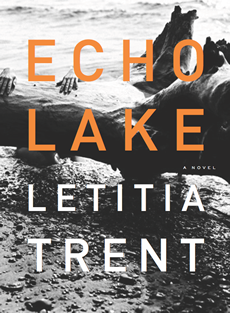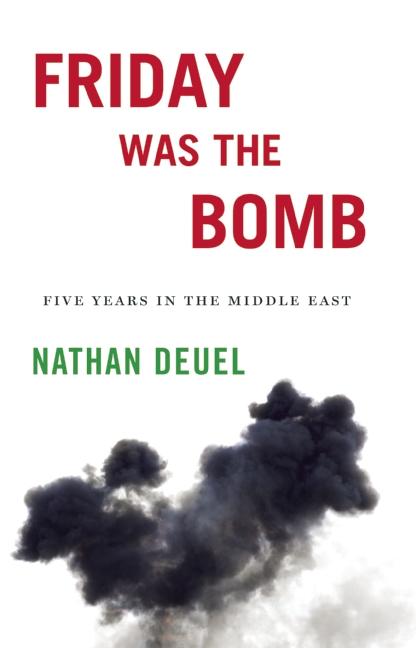Reviewed by Kevin Rippin

Sea Salt: Poems of a Decade, 2004–14, David Mason
Red Hen Press
ISBN-13: 978-1597099653
$18.95, 104 pages
David Mason’s fifth book of poetry, Sea Salt, explores the ineffable degradation of the surface while the internal core remains intact. The poems use “salt” as an over-riding metaphor to define a world that is slowly being eaten away by time and the elements. The lines in most every poem within this volume are plain-spoken, clear, rhythmically assured and cut to weigh against each other. The voice is confident and employs vivid metaphor to express regret, loss, and joy. Poetry, after time and the elements do their bidding, is what remains.
Mason continuously weighs the physical external world against the internal world, and often the layers compound, co-mingle and explode. In “4 July 11,” the speaker watches fireworks in the distance, those “chrysanthemums of fire,” which leads to concerns about what’s happening inside. He writes:
Who cares about freedom, and damn King George?
Who cares about sirens out in city lights?
I’ve got enough to fight about right here,the howitzers let loose inside my ribs,
the thudding ricochet from hill to hill,
from hurt to hurt….
There is a grace and resignation inside these poems that confirms some end is around the corner, maybe the next.
These are the poems of a grown man in a state of reflection, but the poems are not without sneaky humor. In “The Future,” the first two lines display a quiet wit:
The future is best greeted
Without luggage in hand…
And, as Mason speaks about the uninvited dead in “Kefi”:
Their appetites are hollow.
They crowd like moths to the flamebut the poor things cannot burn.
Mason’s confluence with the dead, or the soon-to-be dead—father, teachers, lovers—are comfortable, sympathetic and lively. Mason is studying worlds just over the ridge, worlds that his body will soon join. Yet, the poems have no self-pity. Mason keeps just enough distance for the poems to remain observation rather than overt sentiment.
Since many of the objects of these poems have become intangible, untouchable and vanished, Mason uses poetry to render and preserve them, as in the poem “Mrs. Vitt.” Mrs. Vitt is Mason’s remembered teacher. Mason’s speaker sees her in old age, physically degraded. He tries to apologize for his behavior in second grade. He writes, addressing her:
…Sorry I lied so much.
I must’ve given you a lot of grief.
Mrs. Vitt’s halting response is that of an old teacher, and it is priceless:
No child I taught was any grief to me.
The poetry keeps Mrs. Vitt alive, as poetry does for his ailing father. In “Home Care,” Mason writes about his dad, and the reversal of roles:
He is my boy, regressed at eighty-two
to mooncalf prominence, drugged and adrift.
And I can only play, remembering who
he was not long ago, a son bereft.
Strapped in a car, he sleeps away the hour
we’re caught in the currents of the interstate.
He will be ashes in a summer shower
and sink to roots beneath the winter’s weight.
These poems of extraordinary loss are uniformly well-crafted. This is a poet whose world is being erased before his eyes. The revelation surfaces that we live singular lives despite all the company we keep, and we must die alone. This is clearly stated in the short poem, “Die When You Die”:
You, friend, have far to go. You cannot change
another, and you cannot change yourself.
Let be. Weep when it is time for weeping,
laugh when laughter comes. No one else alive
will have a say in that.
Die when you die.
Only rarely, when Mason decides to become a “Poet,” rather than a keen observer seeing through poetry, do these poems fail to satisfy. Sometimes, especially in the longer poems, Mason’s language becomes a tad talky and soft. And one or two of the poems seem smaller, or more sentimental, than the book deserves. Nevertheless, as a whole, these poems are lucid and strong, full of reflection without self-pity, and laced with earned regret.
In the final poem of the book, “Sea Salt,” Mason cements his theme. The last stanza aptly reads:
The days are made of hours,
hours of instances,
and none of them are ours.
The sand blows through the fences.
Light darkens on the grass.
This too shall come to pass.
Kevin Rippin has published articles, reviews, and poetry in such venues as Kansas Quarterly, Southern Poetry Review, Poetry East, and Pittsburgh Quarterly. His chapbook, One Shuddering Tremolo, was published by Arbuckle Press. A full collection of poems, entitled Amber Drive, was a finalist for the Agnes Lynch Starrett Poetry Prize. He teaches writing at NC A&T University in Greensboro, North Carolina.




